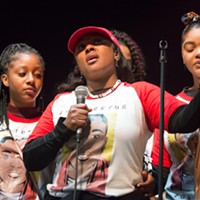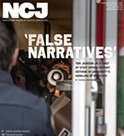[
{
"name": "Top Stories Video Pair",
"insertPoint": "7",
"component": "17087298",
"parentWrapperClass": "fdn-ads-inline-content-block",
"requiredCountToDisplay": "1"
}
]
They sat in a group in the small living room of an Arcata apartment one afternoon in late March, scattered across a couch and the floor. They were all in their early 20s, students at either College of the Redwoods or Humboldt State University. With laptops and cellphones at their hands, they tapped away in studious attention as a young woman called out email address and Twitter handles. There were five of them, including three of non-white ethnicities. Cookies sat on the nearby coffee table and a cat walked around the room, purring at the distracted pets from guests fixated on their screens. The young woman giving out the information broke momentarily from her task.
"I can make coffee. Does anyone else want some?"
The woman, Rain Flotho, a 22-year-old student at CR, organized this event and volunteered her apartment for the day's effort. She had been calling out email addresses, Twitter handles and Facebook pages for a half-hour as her guests typed away and pensively munched snacks.
The gathering came as a part of an ongoing effort at bringing national attention to the death of 19-year-old HSU sophomore David Josiah Lawson, who was fatally stabbed at an off-campus party April 15, 2017, and whose killing remains unsolved. The idea is simple: Under the hashtag #JusticeforJosiah, the people gathered, along with others participating remotely, to send out information about the nearly year-old homicide case that they want to keep from going cold. They are targeting their messages to prominent members of civil rights and social movements, as well as journalists who cover social justice issues in the national press. For Flotho, the project is personal and was spontaneously born out of frustration and a desire to do something about Lawson's killing, which she feared to be losing traction in both the local media and the criminal justice system.
"Over winter break, I was reading up more about the case and I felt really devastated, so I just started emailing people," Flotho says. "And I thought that no one was going to notice my one email but I kept doing it and I felt that it would be really effective if a bunch of people did this at the same time. There's, like, a hope that this would get out there."
Flotho points out that social media activism has been effective, noting the hashtag origins of the Black Lives Matter and Occupy Wall Street movements.
"I feel like I am just learning as I am going, but it's something that I felt like needed to happen and it's one of the only things that I could really think to do to get our voices heard," she says. "[Social media] can be a way where people who feel like they are not being supported can get the word out."
Tony Silvaggio, an assistant professor in Humboldt State University's Sociology Department specializing in social movements and community organizing, sees the positive potential of grassroots social media activism.
"Social media and online platforms certainly have some positive effects, as they play a major role in helping activists [and] movements spread their message to the wider public," Silvaggio says. "We saw that in the Arab Spring and during the protests over the Dakota Access Pipeline, with activists using online platforms to dispute state propaganda and false information about what was happening on the ground. It can be a very effective tool for movements to frame their issues clearly and provide a space for movements and activists to engage with one another, disseminate information, share videos and photos."
About a half-dozen people attended another social media push organized by Flotho, this one on the HSU campus earlier this month. The students, who requested not to be named for fear of backlash from the public and school administrators, all voiced a top-down frustration with the handling of the case by police and the response from local officials. When asked if race was a factor in the unsolved status of the investigation, assent was unanimous. Similarly, all present voiced a distrust of the police and city government's response to Lawson's killing, and were critical of the institutions' ability to provide safety and justice for people of color living in the community.
When asked why they felt uncomfortable using their names in the press, the students' responses varied. One non-binary student mentioned that as a non-African American person, they didn't want to be a dominating presence in a discussion they felt should be headed by African Americans. Another student noted that she had heard first-hand accounts of other activists and non-white students being harassed by members of the public. One young woman mentioned that the amount of scrutiny being levelled toward student activists by the university administrators made her cautious about having her name attached to any activism, no matter how legal or benign. Others voiced frustration at what they felt were unfair portrayals of activists in the local press.
The social media campaign has already drawn some attention. In the days since Flotho organized the first event at her apartment March 21, she has gotten a response from prominent civil rights activist Shaun King. Johnetta Elzie, a Twitter activist and Black Lives Matter leader who helped organize the Ferguson, Missouri, response to the police shooting of Michael Brown, has tweeted about Lawson's case numerous times. The website www.afropunk.com, an aggregator of African-American music, culture and news, published a piece Flotho wrote about the killing. And that is just in the last few weeks.
But there's the sense that things aren't getting better locally. April 15 will mark the year anniversary of Lawsons' death and many feel there are no signs of justice on the horizon. And Flotho and others worry the case will remain unsolved, alleging it has been mishandled by police. Flotho says she plans to move away from Humboldt, seeking a more diverse environment, which gives her some freedom to speak out.
"[The Lawson case] means a lot," she says. "For me, I know what it is like to be a person of color here, a black student, and it's not fucking fun. I am doing this now because I feel like if I were going to be here longer, it really wouldn't be safe for me. A lot of activists have experience with being targeted and threatened, which is why a lot of people usually don't want to put their name on stuff."
Collin Yeo writes the Journal's weekly Setlist music column. He lives in Arcata.
Speaking of...
-

Court Rejects Zoellner Appeal
Jun 28, 2024 -

Judge Rules Arcata Can't Put Earth Flag on Top
Apr 5, 2024 -

Robert William Astrue: 1928-2023
Feb 13, 2024 - More »
Comments (2)
Showing 1-2 of 2
more from the author
-
Music Tonight: Friday, July 26
- Jul 26, 2024
-
Music Tonight: Thursday, July 25
- Jul 25, 2024
-
At the Edge of the Fall
A review of Time is Glass by Six Organs of Admittance
- Jul 25, 2024
- More »
Latest in News
Readers also liked…
-
Through Mark Larson's Lens
A local photographer's favorite images of 2022 in Humboldt
- Jan 5, 2023
-
'To Celebrate Our Sovereignty'
Yurok Tribe to host gathering honoring 'ultimate river warrior' on the anniversary of the U.S. Supreme Court ruling that changed everything
- Jun 8, 2023





































